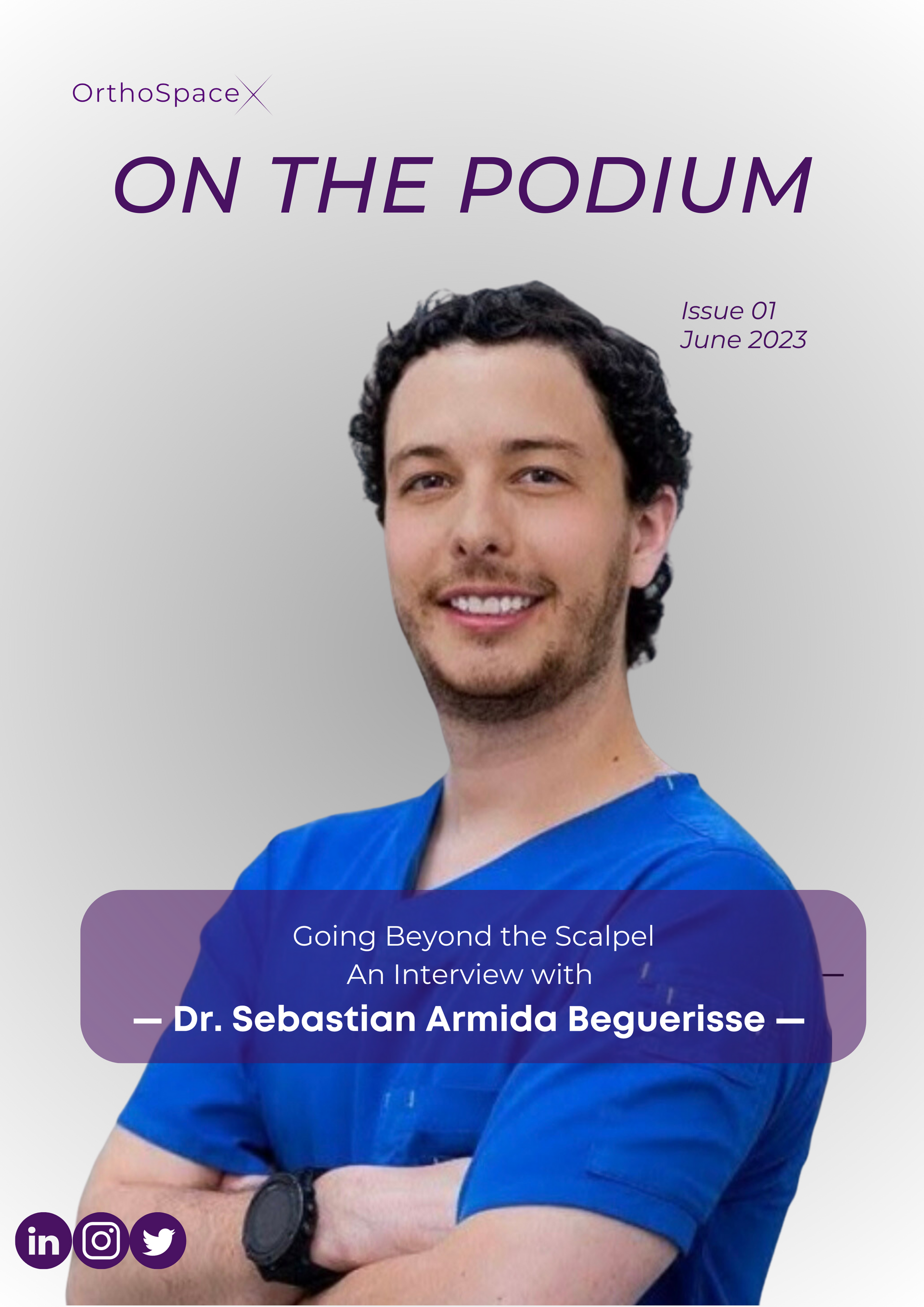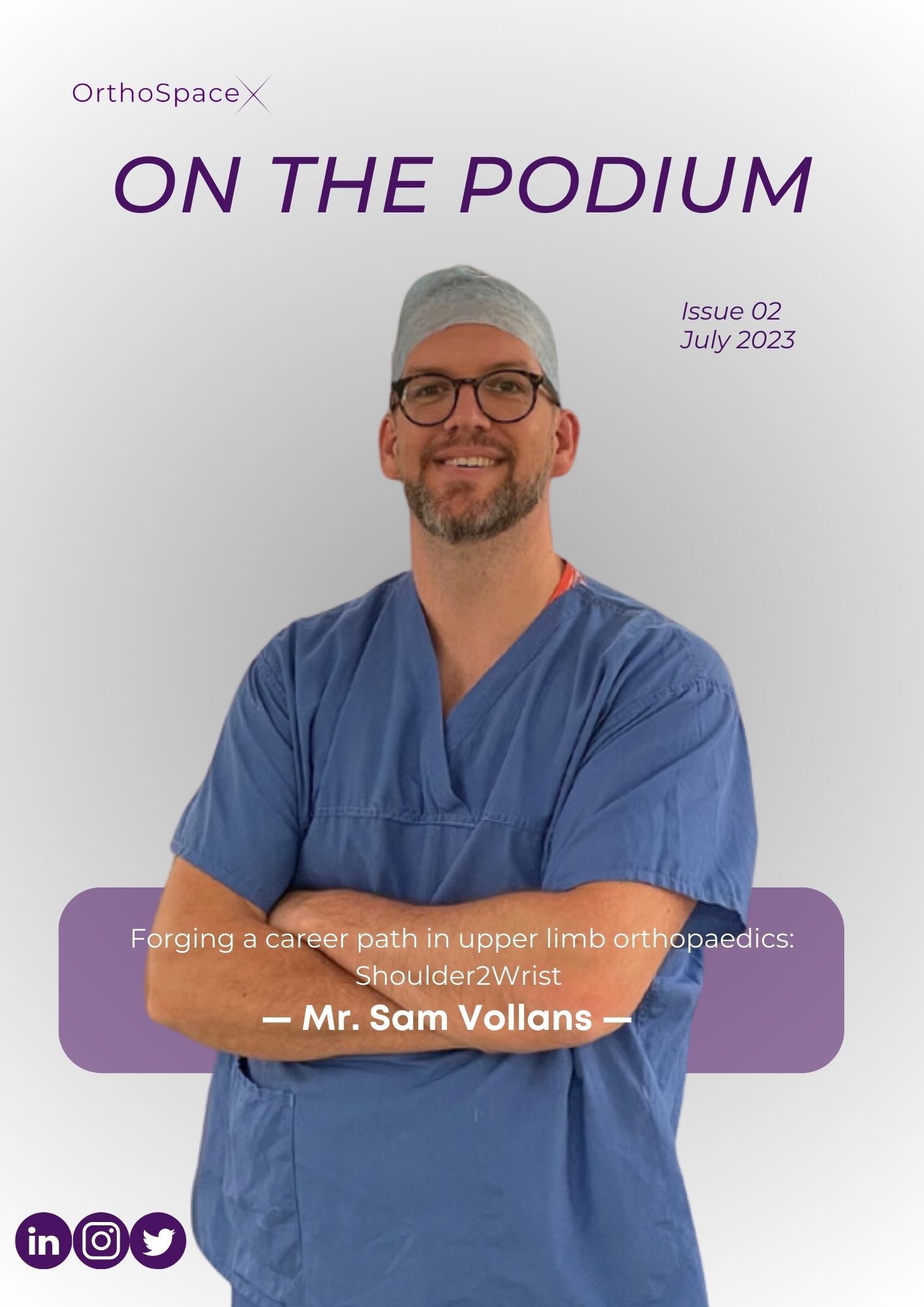From the NHS to Pakistan:
Orthopaedic Excellence Knows No Borders
An Interview with
— Mr. Mustafa Javed —
Issue 04, September 2023

You’ve had an extensive career in orthopaedic surgery with a focus on arthroscopy and keyhole surgery. Could you share some of the most innovative or challenging cases you've encountered in these areas during your experience in Europe and the US?
I have a special interest in management of irreparable rotator cuff tears and joint salvage surgery. My time at the Mayo clinic in Rochester, Minnesota was most memorable. I got to watch and learn tendon transfers, more specifically the arthroscopic assisted lower trapezius transfer which, in my opinion, has been a game changer in shoulder joint salvage surgery and especially in a country like Pakistan, where shoulder replacement surgery can be a costly affair. I’ve been able to offer patients a less invasive and cheaper option for pain relief and restoration of near normal function.
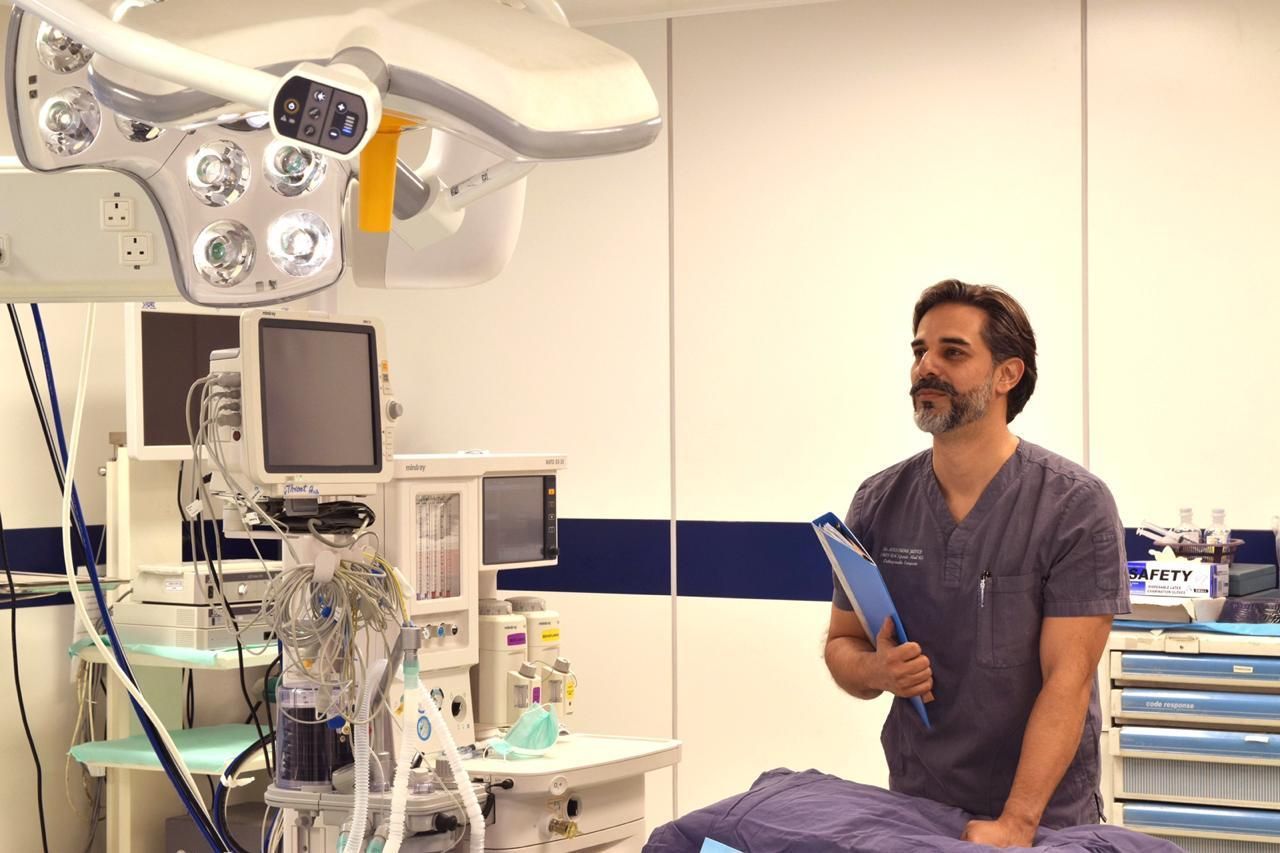
Your educational background includes a wide range of qualifications and training, from MBBS to an MBA in Health Executive. How has this diverse education influenced your approach to orthopaedic surgery and your role as a healthcare professional?
My educational background has certainly helped me to become someone who can think out of the box, can incorporate emotional intelligence into an otherwise labour intense environment, and who can have a practical conversation with hospital management to bring all stakeholders to the table and convince them that all of us are working towards the common goal of improving patient outcomes within the resources available. I used these skills as a consultant in the NHS and now in my hospital in Pakistan.

You've been a member of various orthopedic societies, including the British orthopaedic association and the British Elbow and Shoulder society. Can you discuss the importance of professional networking and collaboration in the field of orthopaedics, and how it has enriched your practice?
You only realise the importance of collaboration with colleagues when you are out in the open and the buck stops with you. I was quick to reach out to colleagues and mentors early in my career and maintained relationships with them not just to discuss difficult cases but also to build bridges between different healthcare systems for mutual learning and growth. I’ve been able to achieve that by organising a yearly meeting and inviting my colleagues from different countries to come to Pakistan and share our experiences with each other. The meeting has now been accredited by the Royal College of Surgeons of Edinburgh and with another coveted British Orthopedic Society.
Given your special interests in trauma and sports injuries, what are some of the emerging trends or advancements in the treatment of these conditions that you find particularly exciting or promising?
One of the most exciting and promising advancements that I’ve seen for sports injuries is the use of tissue regeneration. I often refer to it as a “treatment gap” in patients who did not qualify for surgical intervention and medications and physiotherapy was not enough. We have been stuck in this situation in the past when we used to ask patients to bear with the symptoms and wait for it to get bad enough that we can offer them surgery. Although the jury is out, and we still need concrete evidence to make it standard practice, we are seeing promising results for a selected group of patients with the use of regenerative medicine.
Joint Replacement Surgery is one of your areas of expertise. Could you explain how this type of surgery has evolved over the years and how it significantly impacts the quality of life for patients?
These are very exciting times in the field of joint replacement surgery. In my early years of training we were using standard jigs and “eyeballing” our joint replacement fixations. Don’t get me wrong, the implants were designed in a manner that an average orthopaedic surgeon could do the surgery and offer satisfactory outcomes for patients. The National Joint Registry is a testament to that. But as we have done more and more of these, we have found that precision and accuracy leads to further improvements in outcomes. Patient specific instruments, 3D printing, computer aided navigation and now the use of robots has made all of this possible. These aids have made joint replacement surgery more predictable, reproducible and easier to teach. And most importantly, it has helped in strengthening patient confidence and that directly has a positive impact on recovery and return to some form of normality for them.
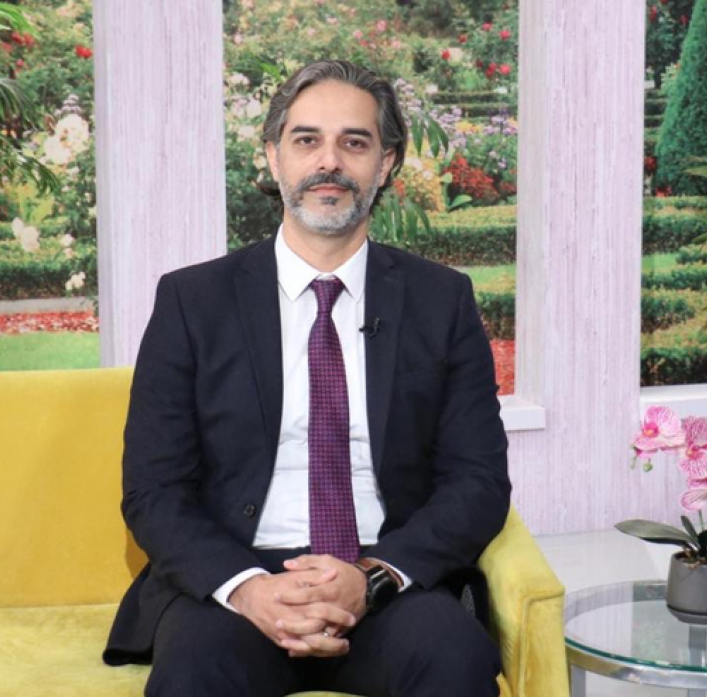
What inspired your decision to transition from practicing in the UK to setting up a medical practice in Pakistan?
I think it was never a whole hearted attempt to relocate to my birth country. My wife and I had moved to the UK in 2003 and I’ve gone through the rigorous process of training from a foundation trainee to a core training and then speciality training in the UK, and ending up achieving my CCT in 2016. Following that I did two years of fellowship in Europe and the US in upper limb surgery and sports orthopaedics. I then ended up becoming a full-time consultant in East Yorkshire. Life was good! But I always thought that I needed to give back to the community that I grew up in. As an experiment, I took time off from my regular work to go and help out the community in Pakistan. I was in Pakistan when the pandemic started and that I think was a driver that helped me decide to stay in Pakistan and serve the community here.
Could you walk us through the process of relocating your practice to Pakistan, including the challenges you faced and any legal or regulatory considerations?
I think the process of relocating was exactly similar to when I had moved to the UK. I had to register with the National Health Council of Pakistan and I had to go through a rigorous process of credentialing with my local hospital. My training and UK degrees are accepted in Pakistan which made things a bit easier for a relatively smooth transition. The laws in the country are defined for patient as well as doctor's protection. But these are not easily accessible to the general public, and there is a general lack of legal literacy. Thankfully, my hospital has a legal department which I can speak to for guidance if there is a need.
How did you adapt to the differences in healthcare systems, patient expectations, and medical practices between the UK and Pakistan when you made this move?
It was certainly a culture shock! Having trained my entire life in the NHS, which is a socialist environment, I found it challenging to move to a fairly corporate style of healthcare environment. I work in a fully private set up which has its pros and cons. On one hand, the patient is paying for the entire treatment either through their pocket or through insurance schemes, which means that I have to be mindful and rationalise my plan of action. On the other hand I have some liberty to innovate and I can make the patient experience better through protocols and guidelines that I have learnt during my training in the NHS. Given that I had a template of how orthopaedic practice runs in the NHS, I was able to quickly replicate that in my private practice. I continue to follow the nice guidelines and other guidance from our British societies and organisations related to orthopaedics , and I have not just introduced it into my practice but preaching and propagating to my colleagues here. I have now been able to arrange yearly meetings with like-minded individuals to bring to Pakistan the practices of the west. To keep myself updated, I regularly get appraised and revalidated in accordance with UK guidelines. I’m also lucky to be an examiner for the international exams run by the Royal College Of Surgeons of Edinburgh, this also helps me keep in touch with my colleagues in the UK and to keep updating myself with current practices. I’m also the international surgical advisor for the college in Pakistan and this allows me to help local trainees get guidance on UK training and exams etc.
What strategies did you personally use to successfully build a patient base and establish your professional presence in the medical community in Pakistan?
I’ve been doing exactly how I have been taught and trained to approach a patient or colleagues in the NHS. I was known to be a team player and I carry on wanting to live up to a certain standard set by myself. To develop a practice in Pakistan does mean to start from scratch. Initially it was quite challenging because neither did people know me nor did I know anybody in the community. I registered myself with the National medical council in Pakistan in order to start practicing in the country. I started by attending local and regional meetings. I presented my limited experience within the country. By establishing rapport with colleagues from both Orthopaedic and non-orthopaedic specialities to slowly build up a referral system.
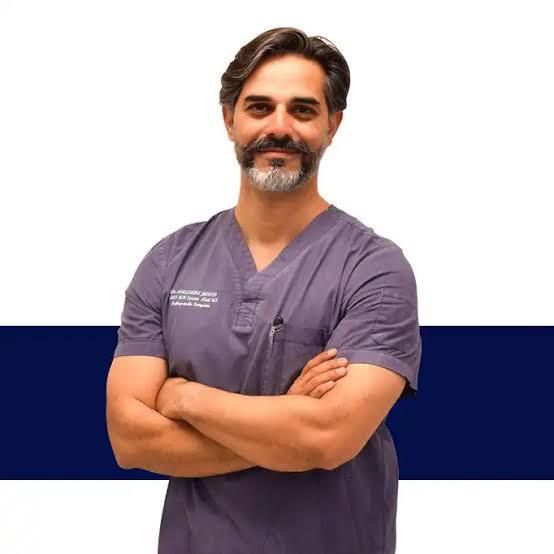
Looking back on your experience, what advice or insights would you share with other healthcare professionals who are contemplating a similar move from the UK to practice abroad?
I would say that anyone who has been
through the robust training system in the UK will know how to adapt to any healthcare system in the world. I tell my colleagues who want to move abroad to remember when they moved from one hospital to another during their training. They are trained enough to manage patients to the highest standard. The first few weeks were trying to learn how the system works and know and manage personalities. Take the move to another country in the same manner as they moved a hospital. Arm yourself with all the skills you were trained in and brace for impact. It’s smooth sailing from there onwards.
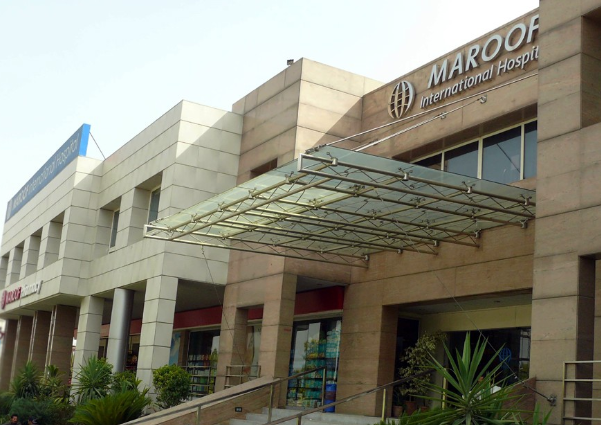
Maroof International Hospital
Mr. Mustafa Javed Bhalli
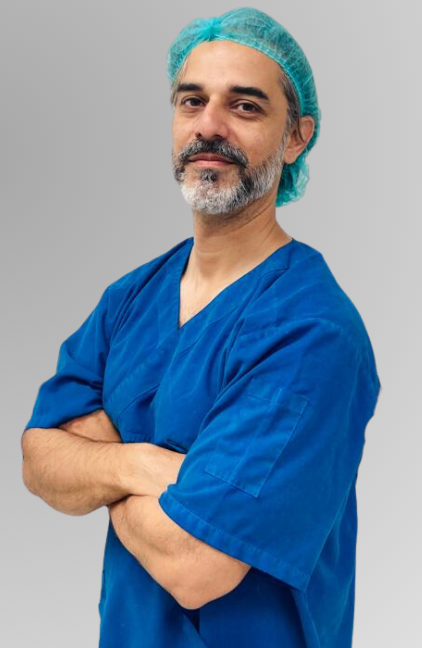
Dr Mustafa is a leading orthopaedic surgeon in the twin cities of Islamabad and Rawalpindi. He is conducting very specialist procedures not routinely done in Pakistan. These include arthroscopy (key-hole surgery) of the knee, shoulder, ankle and hip.
He is an internationally accredited surgeon with FRCS degree in Trauma and Orthopaedics from the Royal College of Surgeons in the United Kingdom and obtaining a Certificate of Completion of Training (CCT) from the prestigious Yorkshire Orthopaedic Rotation Program. Following that he has been on a full time Orthopaedic Consultant Post in the National Health Service (NHS) United Kingdom. This constitutes to 16 years of overseas experience in the United Kingdom the United States and Europe.
Apart from his academic qualifications he is also a Health Executive MBA graduate from the Keele University in the United Kingdom.
He has been a member of various societies including the British Orthopaedic Association, British Elbow and Shoulder Society, British Orthopaedic Training Association. He is currently a member of the internationally renowned AO UK Trauma Society and a long-term member of the Yorkshire Orthopaedic Rotation Trainees.
Dr Mustafa completed his medical degree from Rawalpindi Medical College in 2002 and following this he moved to the United Kingdom where he underwent core and specialist training in various prestigious orthopaedic centres across the United Kingdom culminating to a satisfactory completion of orthopaedic training. Following that he underwent specialist training in joint replacements surgery, trauma and sports injuries and arthroscopy (keyhole surgery) training in centres of excellence in the UK the USA and continental Europe. These included the Mayo Clinic, Johns Hopkins University, and the San Antonio Orthopaedic Group in the USA.
During his training and as a Consultant in the UK, he has gone through various courses relevant to this work including joint replacement courses, trauma courses as well as general courses for effective communication skills and research methodology.
Dr Mustafa is also involved in education both locally and internationally. He is a member of the prestigious Chesterfield FRCS revision course and the Hull FRCS course in the United Kingdom where he is invited every year to teach trainees who are undergoing the FRCS exam. He is also an MRCS Examiner for the Royal College of Surgeons Edinburgh and conducted the first ever MRCS exam in Pakistan recently. He is also the International Surgical Advisor to the Royal College of surgeons Edinburgh for Pakistan.
He has a number of publications that have been published in international and local journals over the period of his service in the United Kingdom and Pakistan and he continues to strive to publish high-quality articles relevant to this field.
He is an excellent public speaker and has been invited to various conferences to present his work locally and internationally.
We would like to thank Mr Javed for his time and insight into orthopaedic excellence.
To download this issue of On The Podium, click below.

Sign up to On The Podium. The latest insights and inspiration from orthopaedic specialists around the globe sent straight to your inbox.
On The Podium
The newsletter brought to you by OrthoSpaceX
| Engage with Orthopaedic Leaders | Exclusive orthopaedic insight | |
| Stay Ahead in Orthopaedic Advancements | Uncover Surgical Innovations | |
| Empower Your Orthopaedic Knowledge | Unlock the Minds of Orthopaedic Specialists |

